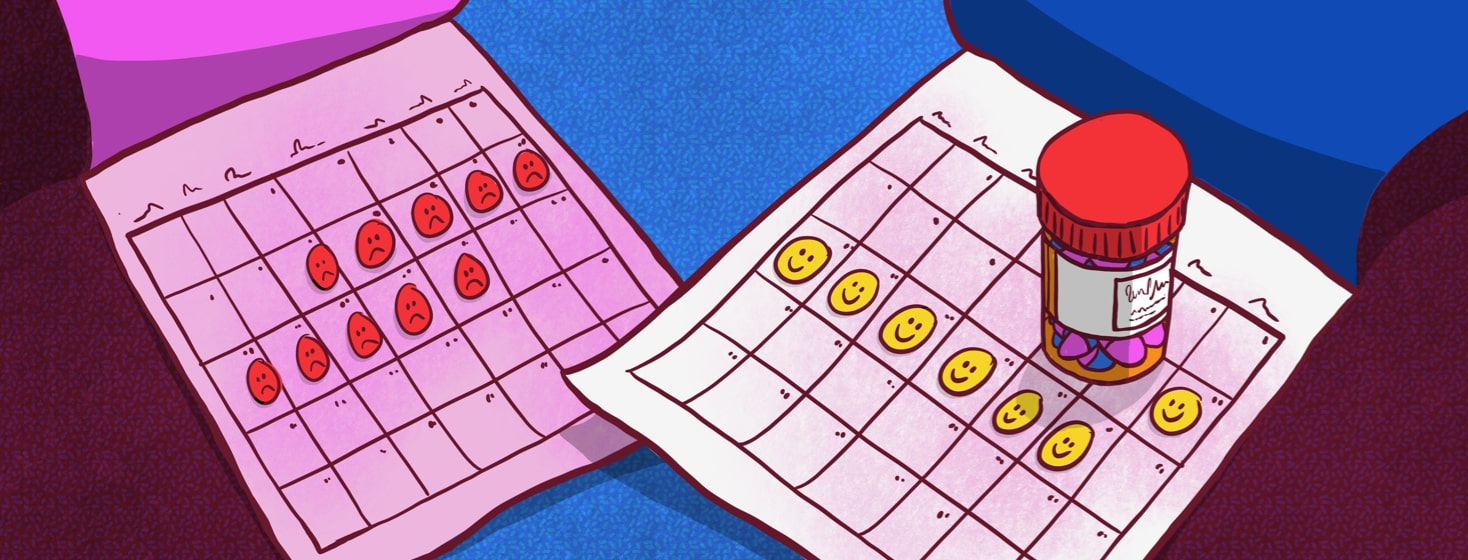I Took Antidepressants for PMDD. Here's What Happened.
I've had premenstrual dysphoric disorder, or PMDD, since I was a teenager. Like everything else about my endometriosis and my period, it's gotten worse in my 30s. Once my symptoms started lasting a full 10 days or longer, I decided to ask my primary doctor if antidepressants could help. And I'm glad I did. But before I get into that, let me explain a little bit more about this very real and debilitating disorder.
What is PMDD?
It's a set of symptoms that happen after ovulation through the start of your period. That's your luteal phase. It's often described as a really severe form of PMS. But it's more than that. It's so distinct that the American Psychiatric Association put it in the fifth version of the Diagnostic and Statistical Manual of Mental Disorders, or DSM-5.
This disorder is in the DSM-5 not because it's "all in your head," but because PMDD has a really serious effect on your mental health. Having a classification is also important because it opens up knowledge and options for treatment.
To get a diagnosis of PMDD, you'll need to have five of the following during your luteal phase over the course of a year:1
- Depressed mood
- Anger or irritability
- Trouble concentrating
- Lack of interest in things in things you like to do
- Mood swings
- Increased hunger
- Too much or too little sleep
- Feeling overwhelmed or out of control
What PMDD feels like for me
I have a history of depression and anxiety — like a lot of other endo warriors. But PMDD isn't just a case of PMS making those things worse. And that's something I made sure my doctor knew.
Here are my most problematic symptoms:
- Restlessness. I'll get a sudden and uncontrollable urge to move around. (I work at a computer, so that's a problem.)
- Irritability. This is actually the telltale sign PMDD has started. I'm usually pretty easygoing, but I'll get an internal feeling of anger and annoyance. It's like all my cells — the ones that affect my voice, included — are really mad at something but I have no idea what. It is extremely uncomfortable.
- Slow psychomotor movements. This is a physical symptom that people with depression often get. But it's not something that happens to me outside of PMDD. I'll have:
- Lack of coordination. I'll actually start dropping or running into things.
- Brain fog. A lot of people with endo or PMS talk about trouble concentrating. But this feels like my thoughts are stuck in mud. Sometimes it feels like maybe the nerves in my brain aren't firing like they should.
- Trouble getting out of bed. I mean this literally. It'll feel like I'm pulling my body out of not-quite-dried concrete.
- Daytime sleepiness. I'm not someone who gets tired during the day. And I definitely don't nap. But about three days before my period starts, I have actually fallen asleep in the middle of working.
- Hopelessness. This usually comes at the end of my PMDD, maybe a day or two before my period starts. It's not just sadness. It's emptiness, like nothing matters. It's a common and serious symptom of serious depression, but, again, not something I get outside of PMDD.
Featured Forum
View all responsesDid antidepressants help?
Yes!
Experts don't know exactly what causes PMDD, but they're pretty sure it has something to do with hormones interfering with serotonin. Like those who get migraines — also me — people who get PMDD may also just be really sensitive to hormone changes. That's why doctors treat it with selective serotonin reuptake inhibitors, or SSRIs.
I tried two SSRIs: fluoxetine (Prozac) and sertraline (Zoloft). They both eased my symptoms pretty fast, like the day I took them. That's because antidepressants work in a different way on PMDD than general depression or anxiety, which can take six weeks or longer to improve with medication. I eventually settled on duloxetine (Cymbalta), which is actually a serotonin norepinephrine reuptake inhibitor (SNRI). Those can help with nerve and muscle pain, too. (More on that in a later post.)
My experience with side effects
Side effects vary wildly between people. So you may not have any problems. But fluoxetine gave me blurry vision, which is pretty common with SSRIs. Sertraline made my lower right eyelid twitch pretty constantly. It didn't hurt, but it was annoying. I'd been interested in trying duloxetine for pain, so my doctor and I figured we'd give that a go.
After more than six menstrual cycles, I can definitely say both SSRIs and SNRIs made a huge difference in my PMDD.
Can you take them just during your luteal phase?
According to my doctor, yes. But I kept having withdrawal effects like headaches and weird mood swings when I only took them for a week then stopped when my period started. So I ended up taking them every day. The plus side is both continuous sertraline and duloxetine greatly reduced the frequency and severity of my menstrual migraines, in addition to my PMDD symptoms.
I'm not sure if I'll take medication forever — I mean, my period will stop one day — but for now, I'm grateful to have found a doctor and pill that can get rid of my PMDD. If you're interested in trying medicine, talk to your primary doctor, OB-GYN, or a psychiatrist. And if they don't think your PMDD needs treatment, go to someone who does.

Join the conversation